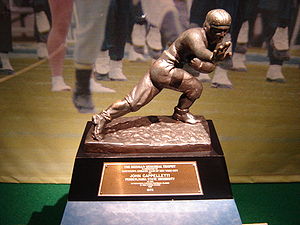 This post is written at Forbes Blogs – Work in Progress.
This post is written at Forbes Blogs – Work in Progress.
As we head into the Bowl season for college football, I’m reminded of all the stories that break about inappropriate behavior between agents and these athletes.
Some might believe that if the agents aren’t going to behave better, the students should be the responsible ones. Unfortunately, you don’t know what you don’t know, and at age 20 or 22, it’s really hard to figure it out…
It wasn’t until I read an Associated Press article with a quote from NCAApresident Mark Emmert that I realized just how hard it could be:“Emmert made an analogy to doors opened for a college student who wants to be an accountant – summer internships, for example. ‘But if a student comes to us and says, “I want to be a professional athlete,” we immediately say, “Well, you can’t talk to anybody in that profession.” I’m not sure that makes a lot of sense…’”
I myself am gearing up for internships this summer, something required for most MBA programs. I did one in undergrad, an incredibly important move for me because it resulted in an entire shift in my professional focus.
I have a number of mentors, constantly work to build my professional network, and never once has someone told me, “I can’t talk to you.” Can it be that with all the perks a revenue-generating student athlete might get, professional development is actually restricted?
Gen-Y is considered a self-centered generation, and often male athletes get held up as examples of that sweeping statement. They are stereotyped as wanting big cars, lots of money and all kinds of fame. We focus on all the money pouring in from sponsorships from Pepsico, FedEx, Allstateand Citigroup, for example, and broadcasting fees from NBC and Fox.
What about the ones who just wanted an education? The ones who know that one more concussion and they’re done? What about the ones who want don’t want to spend the big money because they saw the Recession take everything away from their families?
What about the female athletes who don’t even have as many options for professional sports?
Think about the life lessons you didn’t learn in college, then magnify that to what kind of world a young athlete has to navigate in order to succeed, often with little or no help. Or if there is help, it may be from those who wish to exploit the athlete for personal gain. I thought I had what I needed when I left undergrad, and I can tell you the huge amount of preparation I had still wasn’t enough.
Imagine what it would be like if you weren’t even given the opportunity to prepare.
I believe that we will see potential changes in the ability for students to learn about professional sports while Emmert is president, but we all need to help students take those first steps into the working world because they will be leading it someday. If you or your organization has the resources, continue to provide internships and mentoring programs to students, athletes or not.
If you have life lessons to share, there will always be at least one student willing to listen. If you have seen the other side of being a professional athlete, share what it is you wished you had known.
I am looking forward to seeing what Emmert does in his position, especially because we know for every Heisman Trophy winner, there are thousands of student athletes who become engineers, musicians, bankers and business owners.
Not all student athletes go pro, but they do become professionals, and they should get the information they need.
Image via Wikipedia.





Just goes to show that things are not always as black-and-white as we are made to believe.
Jake, I know. I think in my head I understood that the contact limitations could really hurt athletes, but the idea that it’s as limiting as if I never got an internship, mentor, or network, it’s even more surprising….